The human brain is widely regarded as the ultimate computing engine with extremely high energy efficiency, reliability, and learning and cognitive capabilities. Although the field of brain inspired or neuromorphic computing has made tremendous strides in the last decade, current neuromorphic systems have yet to demonstrate the cognitive functionality of mainstream artificial intelligence (AI) methods (e.g., deep nets) or the energy efficiency approaching that of the brain. The key reasons for this are mismatch between the properties of the mainstream devices and architectures and those of the brain and lack of heterogeneous integration strategies to deliver neuromorphic systems at scale. The proposed Center for HeterogeneouslY integrated BRain InspireD computing (HYBRID) will develop a unified “materials-to-systems” program, as shown in the figure, with a strong emphasis on hardware-software co-design to realize neuromorphic systems with 1000 × improvements in speed, energy, and cognitive abilities compared to state-of-the-art approaches. Our research will support advanced data analytics capabilities with higher processing performance and better system scalability for many advanced AI applications of the future, which are expected to profoundly impact human lives in areas such as energy, advanced manufacturing, public health, security, and business. With its emphasis on radically improving the speed and energy efficiency of neuromorphic systems, HYBRID will also make a sustained and meaningful impact on the next-generation computing infrastructure.

• Co - Director: Shurun Tan, ZJUI
• Co - Director: Jose E Schutt-Aine, UIUC
ZJU/ZJUI Team:
Shurun Tan, Li Da, Wenchao Chen, Said Mikki, Aili wang, Ma Hanzhi, Zhao Liang, W Qiu;
UIUC Team:
Jose E Schutt-Aine, Shaloo Rakheja, Saugata Ghose, Lav R Varshney;
Theme 1: Neurobiology-Driven Algorithms and Hardware-Software Co-Design
Theme 2: Modeling Intelligent Materials and Multi-Functional Neuroprimitives
Theme 3: Designing Scalable Circuit Macros and Architectures
Theme 4: Integrating Heterogeneous Components and Chiplets at The System Level








